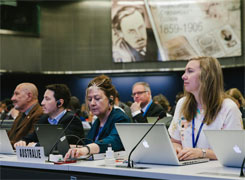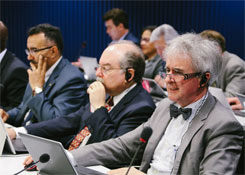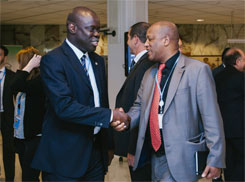Information Session on WSIS
The second day of Council 2015 started with an information session on WSIS, focusing on the 2015 WSIS Forum, which will be taking place in Geneva from 25 to 29 May, immediately after Council. This year's Forum is aimed at enhancing cooperation, partnership and innovation, and the exchange of experiences and good practices. More than 1,500 stakeholders from over 140 countries are expected to attend, including more than 100 ministers, ambassadors, and heads of agencies, as well as many CEOs and high level representatives from the private sector, civil society and academia. During the WSIS Forum a WSIS and SDGs Matrix will be released. The United Nations General Assembly will be conducting the WSIS Overall Review of WSIS+10 from 1 June in new York; ahead of that, on the last day of this year's WSIS Forum, 29 May, there will be a WSIS session in Geneva entitled 'Consultations on WSIS Beyond 2015'.
Third Plenary Meeting
The third plenary meeting was opened with a minute of silence following Monday's earthquake in Nepal and a train accident in the United States, in solidarity with the victims and their families.
Operational Plans
The Deputy Secretary-General, Malcolm Johnson, introduced the documents covering the Operational Plans for the three Sectors, ITU-R, ITU-T, ITU-D, and the General Secretariat and the Draft Resolution adopting them –
C15/28(Rev.1),
C15/29,
C15/30,
C15/31,
C15/39. The four-year rolling operational plan for ITU-R covering the period from 2016-2019 was presented by the Deputy Director of the Radiocommunication Bureau, Mario Maniewicz. The four-year rolling operational plan for ITU-T was presented by the Deputy Director of the Telecommunication Standardization Bureau, Reinhard Scholl. The four-year rolling operational plan for ITU-D was presented by the Deputy Director of the Telecommunication Development Bureau, Yushi Torigoe. The four-year rolling operational plan for the General Secretariat was presented by the Chief of the Strategic Planning and Membership Department, Doreen Bogdan-Martin.
Councillors expressed their thanks to the ITU Secretariat for developing the operational plans and appreciated the introduction of the new style for the documents. Discussion was focused on the need to further reinforce the role and activities of the ITU regional offices, as well as the need to further reinforce results-based management, and to deliver better linkages with the financial and strategic plans (and notably financial information for the second biennium, 2018-2019; this will be provided later in 2015). It was noted that there was some duplication between outcome and output indicators, which should be avoided in future. The need to continue incorporating the views of the three Advisory Groups (RAG, TSAG, TDAG) was emphasized. Questions were raised regarding the assistance to Members provided by the Radiocommunication Bureau for the transition to digital television broadcasting as well as on spectrum auctioning. The Director of BR explained the joint work carried out by BR and BDT in those areas. For the specific case of digital switchover, he mentioned that the target included in the Operational Plan for 2020 is 95%, which was rather ambitious and would imply that significant support will be provided to Members to help achieve it. Regarding best practices in spectrum auctioning, he suggested that a new question on this topic could be put to the consideration of the forthcoming Radiocommunication Assembly. The need to see if better ways could be found to track the actual use of, and conformance to, ITU-T standards was also raised; ITU-T acknowledged the challenge to further improve the KPIs for conformance, and welcomed suggestions from membership.
The Deputy-Secretary General appreciated support from Council to the new style of operational plans and confirmed that all comments will be taken into consideration for its further improvement. It was agreed by Council that the Secretary-General and the Directors be given the flexibility needed, within existing procedures, including the financial regulations and rules, in order to implement the four-year rolling operational plans.
The Secretary-General, Houlin Zhao, thanked Councillors for their appreciation and comments, and assured Council that the Secretariat would return with an updated plan at the 2016 session of Council. The Director of BDT, Brahima Sanou, informed Council that the top priority of BDT was to implement the regional initiatives and encouraged Councillors to further discuss the topic during the presentation of document
C15/25 on Strengthening the regional presence.
ITU Headquarters Premises
The Chair of the Council Working Group on options for the Union's Headquarter Premises over the long term (CWG-HQP), Xavier Bellmont, presented the CWG report (Res 194),
C15/7. It was noted that CWG-HQP intended to meet again in September, with the aim of subsequently being able to provide all of the information necessary for Council 2016 to be able to make a decision on the matter.
The Secretariat presented the document on Guidelines for Member States regarding the hosting of ITU headquarters,
C15/92, providing guidelines on all the requirements and prerequisites of hosting the ITU HQ, and identifying privileges, immunities and facilities.
The Councillor from Germany presented document
C15/74+C1, from a number of European countries, dealing with options for the Union's Headquarters premises over the long term, and requesting that the most fundamental issues be addressed with urgency in order for decisions to be made at the 2016 session of Council. A request was made for Council to instruct CWG-HQP to cease pursuing Option 3 (rental as a long-term solution), as it is the least viable financial solution, and Option 4 (alternative location for the Union), as no serious offer has thus far been made.
The Councillor from India presented document
C15/76, a contribution concerning further long-term options, and notably the financial implications of relocating part or all of the Union to another host country.
A significant number of Councillors took the floor to discuss the various options available, noting the need to ensure the long-term future of the Union, and endorsing the positions set out in C15/74, and in particular the requests to remove options 3 and 4 from the list of options to be considered, leaving options 1 and 2, the options to replace the Varembé building or to extensively renovate existing buildings. It was noted that even though relocation could be financially advantageous, it presented a number of problems, including the need to modify the Convention and Constitution (which can only be done by the Plenipotentiary Conference); there was nonetheless support from some Councillors for retaining option 4, at least for the time being. Questions were raised concerning the future needs of the Union (in terms of space, if staff numbers are reduced, for example) and the costs for delegates of participating at events in Geneva. It was noted by the host country and other delegations that this has become an urgent issue, as the Varembé building is already no longer compliant with some Swiss standards and regulations and will be non-compliant in terms of security from 2017; Switzerland voiced its strong support for option 1 (replacement).
The Secretary-General, Houlin Zhao, took the floor to address the issue, noting that this has been under discussion since 2007, when it was first brought up by the previous Secretary-General, Hamadoun Touré. Clearly the question is not a simple one; while relocation is a possible long-term solution, it would not be possible within the next decade, in the Secretary-General's opinion, due to the constraints of decisions needed by the Plenipotentiary Conference, etc. The Secretary-General therefore suggested that the Secretariat and CWG-HQP continue their discussions with the host country in order to provide the best possible information to the next session of Council in 2016.
In summarizing, the chair noted that there was clear consensus on the suppression of option 3. Council therefore agreed to instruct CWG-HQP to focus only on the three remaining options: replacement, renovation, and relocation. CWG-HQP needs to explore alternative means to finance, and the Secretariat needs to provide all the necessary information one month before the next meeting of CWG-HQP in September. It was noted that countries interesting in hosting ITU in the future should make their interest known, as requested by PP-14, before the January 2016 meeting of CWG-HQP.
Budget for the 2016/2017 Biennium
After a long morning session, the third plenary meeting continued in the early afternoon, with the Secretariat presenting the draft budget for the 2016-2017 biennium,
C15/10(Add.1). The draft budget presented – after much work on the part of the Secretariat – is balanced, with no withdrawal from the Reserve Account. A total of CHF 321.3 million is forecast in the draft budget for 2016-2017 compared to CHF 331 million in 2014-2015, representing a decrease of CHF 9.7 million. The draft budget includes expenditure for two global events: WTSA-16 and WTDC-17; the WTDC had originally been intended for 2018, and CHF 2.45 million has been allocated from the Reserve Account for this purpose, to be refunded during the 2018-2019 biennium; the shift from one biennium to the other does not affect the total amount of the Financial Plan as approved by PP-14 in Decision 5 (Rev. Busan, 2014).
A number of Councillors commended the Secretariat for presenting a balanced budget. Some Councillors expressed the need to continue seeking opportunities for cost reductions, while other noted that ITU should seek extra revenues in future if it is not to enter a vicious circle of reductions. Concerns were raised by several Councillors over the number of posts / post reductions in the Radiocommunication Bureau, and it was suggested that the revenue from ITU-R publications could be used to finance further work within the Sector; this issue will be addressed in the standing committee on administration and management (ADM).
The Council Highlights are provided as a service to ITU Member State Administrations. They are not official documents, and do not provide a substitute for the Summary Record; we nonetheless hope that Member State Administrations will find them useful and informative.
|
Quick Links
Photos










|
|
